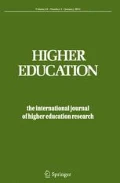Abstract
The present study addressed the question of consistency and variability in learning strategies. Four university courses provided different learning contexts. The same group of students reported about their learning strategies by completing identical questionnaires on each of these courses. Participants were 85 students attending the first year of Law studies. A second study consisted of 63 students attending similar courses in the following academic year. An analysis of variance showed that students varied their reported learning strategies as a function of different learning contexts. This indicated a context-specific component in strategy use. Intercorrelations, however, showed that students displayed consistency in reported learning strategies across course contexts as well. This indicated a personal, habitual component in strategy use. It thus seems that the question of variability and consistency in learning strategies does not yield an ‘either-or’, answer. Context variables were explored to explain the variations. Use of stated cases, provision of a clear organisation of subject matter and of diverse didactic resources appeared to diminish encountered problems and lack of regulation (which proved to be related variables), and promote the use of concrete processing, relating, analyzing, self-regulation and externally regulated strategies. Evidence was found that learning strategies differed among each other in the degree of variability. Memorizing turned out to be relatively resistant to differences in course context, whereas concrete processing strategies and lack of regulation showed relatively large susceptibility to course context. Explanations were proposed in terms of different stages in the development of learning strategies and in terms of context-variables.
Similar content being viewed by others
References
Biggs, J.B. (1987). Student Approaches to Learning. Hawthorn, Vict.: Australian Council for Educational Research.
Biggs, J.B. (1993). ‘What do inventories of students' learning processes really measure? A theoretical review and clarification’, British Journal of Educational Psychology 63, 3-19.
Boekaerts, M. (1996). ‘Personality and the psychology of learning’, European Journal of Personality 10, 377-404.
Eley, M.G. (1992). ‘Differential adoption of study approaches within individual students’, Higher Education 23, 231-254.
Entwistle, N. and Marton, F. (1984). ‘Changing conceptions of learning and research’, in Marton, F., Hounsell, D. and Entwistle, N. (eds.), The Experience of Learning. Edinburgh, Great Britain: Scottish Academic Press, pp. 211-236.
Entwistle, N. and Ramsden, P. (1983). Understanding Student Learning. London: Croom Helm.
Geisler-Brenstein, E., Schmeck, R.R. and Hetherington, J. (1996). ‘An individual difference perspective on student diversity’, Higher Education 31, 73-96.
Hadwin, A.F., Winne, P.H., Stockley, D.B., Nesbit, J.C. and Woszczyna, C. (1997, March). Context moderates students' self-reports about how they study. Paper presented at the American Educational Researchers Association Annual Meeting, Chicago, IL.
Lonka, K. and Lindblom-Ylänne, S. (1996). ‘Epistemologies, conceptions of learning, and study practices in medicine and psychology’, Higher Education 31, 5-24.
Marton, F. and Säljö, R. (1997). ‘Approaches to learning’, in Marton, F., Hounsell, D. and Entwistle, N. (eds.), The Experience of Learning: Implications for Teaching and Studying in Higher Education(2nd ed.). Edinburgh, Great Britain: Scottish Academic Press, pp. 39-58.
Maxwell, S.E. and Delaney, H.D. (1990). Designing Experiments and Analyzing Data — A Model Comparison Perspective. Belmont, CA: Wadsworth Publishing Company.
Pask, G. (1988). ‘Learning strategies, teaching strategies, and conceptual or learning style’, in Schmeck, R.R. (ed.), Learning Strategies and Learning Styles. New York: Plenum Press, pp. 83-100.
Ramsden, P. and Entwistle, N.J. (1981). ‘Effects of academic departments on students' approaches to studying’, British Journal of Educational Psychology 51, 368-383.
Schmeck, R.R. (1983). ‘Learning styles of college students’, in Dillon, R.F. and Schmeck, R.R. (eds.), Individual Differences in Cognition: Vol. 1. New York: Academic Press, pp. 233-279.
Schmeck, R.R. (1988). ‘Strategies and styles of learning-An integration of varied perspectives’, in Schmeck, R.R. (ed.), Learning Strategies and Learning Styles. New York: Plenum Press, pp. 317-347.
Tait, H. and Entwistle, N.J. (1996). ‘Identifying students at risk through ineffective study strategies’, Higher Education 31, 97-116.
Thomas, P.R. and Bain, J.D. (1984). 'Contextual dependence of learning approaches: The effects of assessments, Human Learning 3, 227-240.
Trigwell, K. and Prosser,M. (1991). ‘Improving the quality of student learning: The influence of learning context and student approaches to learning on learning outcomes’, Higher Education 22, 251-266.
VanderStoep, S.W., Pintrich, P.R. and Fagerlin, A. (1996). ‘Disciplinary differences in self-regulated learning in college students’, Contemporary Educational Psychology 21, 345-362.
Vermunt, J.D.H.M. (1992). Leerstijlen en Sturen van Leerprocessen in het Hoger Onderwijs — Naar Procesgerichte Instructie in Zelfstandig Denken. [Learning Styles and Regulation of Learning in Higher Education — Towards Process-oriented Instruction in Autonomous Thinking]. Amsterdam: Swets & Zeitlinger.
Vermunt, J.D.H.M. (1994). ‘Design principles of process-oriented instruction’, in De Jong, F.P.C.M. and Van Hout-Wolters B.H.A.M. (eds.), Process-Oriented Instruction and Learning from Text. Amsterdam: VU University Press, pp. 15-26.
Vermunt, J.D. (1996). ‘Metacognitive, cognitive and affective aspects of learning styles and strategies: A phenomenographic analysis’, Higher Education 31, 25-50.
Vermunt, J.D. (1998). ‘The regulation of constructive learning processes’, British Journal of Educational Psychology 68, 149-171.
Volet, S., McGill, T. and Pears, H. (1995). ‘Implementing process-based instruction in regular university teaching: Conceptual, methodological and practical issues’, European Journal of Psychology of Education 10, 385-400.
Weinstein, C., Schulte, A. and Palmer, D. (1987). Learning and Study Strategies Inventory (LASSI). Clearwater, FL: H&H Publications.
Author information
Authors and Affiliations
Rights and permissions
About this article
Cite this article
Vermetten, Y.J., Lodewijks, H.G. & Vermunt, J.D. Consistency and variability of learning strategies in different university courses. Higher Education 37, 1–21 (1999). https://doi.org/10.1023/A:1003573727713
Issue Date:
DOI: https://doi.org/10.1023/A:1003573727713




